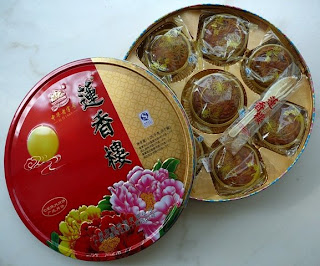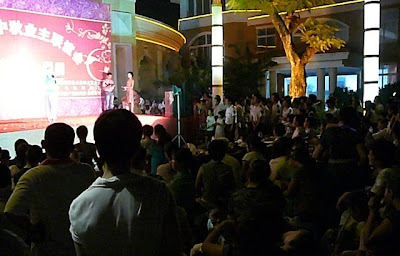 There’s extra anticipation as we approach Mid Autumn Festival for this is the first time that it’s marked with a public holiday. Our friends tell us it is a day to spend with family, to give and eat moon cakes (a solid paste, of varying flavours, covered with moulded pastry), often with pomelos (a large citrus fruit), and to view the full moon. Of course on this side of the hemisphere, where the seasons are back-to-front and the moon is upside-down, we have the woman-in-the-moon and a rabbit too. I’ll be looking out for them both!
There’s extra anticipation as we approach Mid Autumn Festival for this is the first time that it’s marked with a public holiday. Our friends tell us it is a day to spend with family, to give and eat moon cakes (a solid paste, of varying flavours, covered with moulded pastry), often with pomelos (a large citrus fruit), and to view the full moon. Of course on this side of the hemisphere, where the seasons are back-to-front and the moon is upside-down, we have the woman-in-the-moon and a rabbit too. I’ll be looking out for them both!

Moon cakes, often in elaborate packaging, have been on sale for several weeks and the commercial opportunities have not gone unexploited. Wal-Mart’s marketing material is full of promotions and their front entrance clogged with displays, complete with spruikers. The bakeries and chain tea shops are producing some very modern and upmarket versions, and there are stalls set up in the streets selling boxes and loose cakes too.


My limited Chinese reading skills diminishes my enjoyment of moon cakes; I can end up eating savoury seaweed ones, or stick sweet fruit ones or ones with egg yoke without any idea of what I’ll get. But I will be eating moon cakes, lots of them, as we’ve been given quite a number by colleagues and friends, and I also acquired a big box at the street party organised by our apartment complex.

 The party, one of two we went to on the Friday of the long weekend, was a large affair. The apartment complex managers cordoned of one of the internal streets, set up a stage, and organised stalls and games on the side. Earlier in the day I had seen about 10 security guards lining up blue plastic stools and another 20 or so practicing a marching routine. The performance involved celebrity presenters, singing and dancing, included traditional forms and the very popular contemporary break dancing, and games and giveaways. As the only foreigners at the event I was soon invited to play and, to my embarrassment, singled out by the hosts and asked a lot of questions, in Chinese! Even more embarrassingly I then won, but was later told that, as I was a guest, many of the audience were hoping I would win the expensive wine and moon cakes.
The party, one of two we went to on the Friday of the long weekend, was a large affair. The apartment complex managers cordoned of one of the internal streets, set up a stage, and organised stalls and games on the side. Earlier in the day I had seen about 10 security guards lining up blue plastic stools and another 20 or so practicing a marching routine. The performance involved celebrity presenters, singing and dancing, included traditional forms and the very popular contemporary break dancing, and games and giveaways. As the only foreigners at the event I was soon invited to play and, to my embarrassment, singled out by the hosts and asked a lot of questions, in Chinese! Even more embarrassingly I then won, but was later told that, as I was a guest, many of the audience were hoping I would win the expensive wine and moon cakes.
 The other party, an invitation-only event for government officials and potential investors, was at the partially finished apartment complex next to ours. It was a glamorous occasion with an imposing main stage for speeches and a band lip-syncing jazz favourites. Other groups of classical and traditional musicians were scattered through the planting and water features with dry ice adding to the atmosphere. Huge platers of fruit and sweets were offered as well as traditionally made green tea, but most importantly there were opportunities to win prizes. Finally, just when we thought it was all over, an impressive firework display was launched.
The other party, an invitation-only event for government officials and potential investors, was at the partially finished apartment complex next to ours. It was a glamorous occasion with an imposing main stage for speeches and a band lip-syncing jazz favourites. Other groups of classical and traditional musicians were scattered through the planting and water features with dry ice adding to the atmosphere. Huge platers of fruit and sweets were offered as well as traditionally made green tea, but most importantly there were opportunities to win prizes. Finally, just when we thought it was all over, an impressive firework display was launched.
 Both these parties had games based on the local tradition of moon cake gambling. This involves a bowl and six dice; the aim is to get lots of 4’s and prizes are given through the game on different winning combination. At the end the person who has thrown the highest combination wins. Prizes range in value and might be sweets and different sized moon cakes or household goods such as small packs of tissues (vital in an environment where toilet paper is frequently not provided), shampoo, cooking oil (expensive and often used as an offering to the gods), and bed linen or even much valued electrical appliances. Gambling events may be organised by family groups, or companies, and of course the marketing potential is exploited with shops developing versions you can participate in, if you spend enough money!
Both these parties had games based on the local tradition of moon cake gambling. This involves a bowl and six dice; the aim is to get lots of 4’s and prizes are given through the game on different winning combination. At the end the person who has thrown the highest combination wins. Prizes range in value and might be sweets and different sized moon cakes or household goods such as small packs of tissues (vital in an environment where toilet paper is frequently not provided), shampoo, cooking oil (expensive and often used as an offering to the gods), and bed linen or even much valued electrical appliances. Gambling events may be organised by family groups, or companies, and of course the marketing potential is exploited with shops developing versions you can participate in, if you spend enough money!
We are, of course, keen to see the moon on Mid Autumn Festival so head for the river. Along the bank, just for summer, are a string of open-air restaurants that are packed with festive groups of families and friends of all generations. We congregate at one of the many round tables, protected by a thin red plastic ‘table cloth’, and pop open the plastic wrapper on our vacuum packed tableware. Cold beer is organised, with a little difficulty, and a seafood meal is ordered and fished live from the tanks lining the cooking area. There is little breeze to mitigate the sticky weather, or ripple the river allowing it to reflect the gaudy building lights and the occasional bursts of fireworks. Heavy clouds blank out the sky and it looks like we will be disappointed, but they part, intermittently and momentarily, to reveal the full moon. Small orange lights drift through the heavens and after some debate we identify them as hot air balloons. Silently the sky fills with the paper constructions fuelled by small flames, and we notice several being launched behind us. Our local friends say this is a new trend and we, with them, are soon excitedly purchasing and launching our own balloon. As we watch it fill with hot air and float up to the higher cross currents I reflect that, however enjoyable they were, the elaborate parties are eclipsed in by this simple activity undertaken with friends.



 With this theory in mind I decide to take another approach; find a new supplier locally and build a relationship with them face-to-face. I walk the streets around the vegetable market in our emerging neighbourhood. Many of the new shops are vacant, but I find a place with both gas and water bottles piled up, a motor bike and very little else. I pull out pre-prepared notes of what I might have to say, or be asked, laboriously written in characters as well as pinyin. The lithe women looks at me blankly when I ask for water, her plumper husband looks at me blankly. I pull out my written notes and the man walks away. Maybe they only understand Mǐnnánhuà, the local dialect, maybe they can’t read? I feel utterly defeated, but I can’t give up and am about to start an elaborate charade when the man returns with the young women from the tea shop next door - she can speak workable English. It looks like we will have water after all. I buy 2 new bottles of water; ¥30 for each bottle, refundable on return, and ¥8 for 18.9 litres of water. The wiry woman follows me to the apartment on the motor bike and carries both bottles up 4 flights of stairs. I can barely lift one on to the cooler.
With this theory in mind I decide to take another approach; find a new supplier locally and build a relationship with them face-to-face. I walk the streets around the vegetable market in our emerging neighbourhood. Many of the new shops are vacant, but I find a place with both gas and water bottles piled up, a motor bike and very little else. I pull out pre-prepared notes of what I might have to say, or be asked, laboriously written in characters as well as pinyin. The lithe women looks at me blankly when I ask for water, her plumper husband looks at me blankly. I pull out my written notes and the man walks away. Maybe they only understand Mǐnnánhuà, the local dialect, maybe they can’t read? I feel utterly defeated, but I can’t give up and am about to start an elaborate charade when the man returns with the young women from the tea shop next door - she can speak workable English. It looks like we will have water after all. I buy 2 new bottles of water; ¥30 for each bottle, refundable on return, and ¥8 for 18.9 litres of water. The wiry woman follows me to the apartment on the motor bike and carries both bottles up 4 flights of stairs. I can barely lift one on to the cooler.
















































